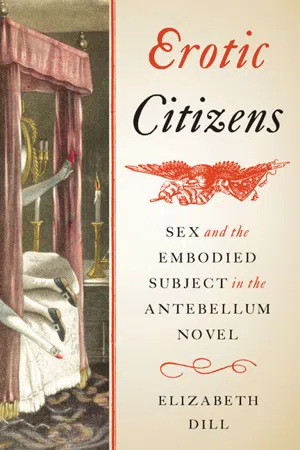
- 296 pages
- English
- ePUB (mobile friendly)
- Available on iOS & Android
About This Book
What is the role of sex in the age of democratic beginnings? Despite the sober republican ideals of the Enlightenment, the literature of America's early years speaks of unruly, carnal longings. Elizabeth Dill argues that the era's proliferation of texts about extramarital erotic intimacy manifests not an anxiety about the dangers of unfettered feeling but an endorsement of it. Uncovering the more prurient aspects of nation-building, Erotic Citizens establishes the narrative of sexual ruin as a genre whose sustained rejection of marriage acted as a critique of that which traditionally defines a democracy: the social contract and the sovereign individual.
Through an examination of philosophical tracts, political cartoons, frontispiece illustrations, portraiture, and the novel from the antebellum period, this study reconsiders how the terms of embodiment and selfhood function to define national belonging. From an enslaved woman's story of survival in North Carolina to a philosophical treatise penned by an English earl, the readings employ the trope of sexual ruin to tell their tales. Such narratives advanced the political possibilities of the sympathetic body, looking beyond the marriage contract as the model for democratic citizenship. Against the cult of the individual that once seemed to define the era, Erotic Citizens argues that the most radical aspect of the Revolution was not the invention of a self-governing body but the recognition of a self whose body is ungovernable.
Frequently asked questions
Information
Index
Table of contents
- Cover
- Title Page
- Copyright Page
- Contents
- List of Illustrations
- Acknowledgments
- Introduction: Sexual Ruin and the Early American Novel
- One. The Aesthetic Work of the Ruin Narrative
- Two. Ruin’s Subject in Shaftesbury’s Characteristicks
- Three. Incest and the Nature of Ruin in the Novels of William Hill Brown
- Four. Seduction and the Patriotism of Ruin in Hannah Webster Foster’s The Coquette
- Five. Ruin, Martyrdom, and the Spectacle of Sympathy from Clotel to The Scarlet Letter
- Six. Ruin, Rape, and the Aesthetic Work of Clarissa in England and America
- Conclusion: The Anatomy of Ruin
- Notes
- Bibliography
- Index